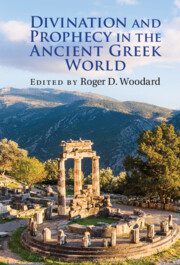Book contents
- Divination and Prophecy in the Ancient Greek World
- Divination and Prophecy in the Ancient Greek World
- Copyright page
- Contents
- Contributors
- Acknowledgments
- Abbreviations
- General Introduction
- 1 Greek Divination as the Transformation of an Indo-European Process
- 2 On Divinatory Practices and la raison des signes in Classical Greece
- 3 Oracle and Client
- 4 Oracular Failure in Ancient Greek Culture
- 5 The Dynamism of Mouvance in the Pronouncements of the Delphic Oracle
- 6 Decentralising Delphi: Predictive Oracles, Local Knowledge and Social Memory
- 7 Oracular Tales before Historiography
- 8 Omens and Portents Foretelling Victory and Defeat: Ontological, Literary, and Cognitive Perspectives
- 9 The Use of Divination by Macedonian Kings
- 10 False Prophets and Fake Prophecies in Lucian
- 11 Afterword
- Bibliography
- Index
6 - Decentralising Delphi: Predictive Oracles, Local Knowledge and Social Memory
Published online by Cambridge University Press: 22 December 2022
- Divination and Prophecy in the Ancient Greek World
- Divination and Prophecy in the Ancient Greek World
- Copyright page
- Contents
- Contributors
- Acknowledgments
- Abbreviations
- General Introduction
- 1 Greek Divination as the Transformation of an Indo-European Process
- 2 On Divinatory Practices and la raison des signes in Classical Greece
- 3 Oracle and Client
- 4 Oracular Failure in Ancient Greek Culture
- 5 The Dynamism of Mouvance in the Pronouncements of the Delphic Oracle
- 6 Decentralising Delphi: Predictive Oracles, Local Knowledge and Social Memory
- 7 Oracular Tales before Historiography
- 8 Omens and Portents Foretelling Victory and Defeat: Ontological, Literary, and Cognitive Perspectives
- 9 The Use of Divination by Macedonian Kings
- 10 False Prophets and Fake Prophecies in Lucian
- 11 Afterword
- Bibliography
- Index
Summary
Delphi did not play a crucial part in the creation and circulation of the predictive oracles. After recalling the importance that the modern narrative of ancient Greek history accords to the idea of Delphi, the relationship between oracular texts, events and historical narrative tradition is discussed, focusing on the question of whether the oracles are pertinent to the event or to the narration of the event. There are reasons to assume that the Delphic predictive responses were integral constituents of oracle stories embedded in narratives usually shaped by popular local knowledge. It can be argued that the origin of those oracle stories coincided with the development of the relevant ‘local’ traditions. What is more, oracular narratives contributed not only to reconfigure the past but also to construct an image of an event, or even the alleged event itself. The conclusion is that the oracle stories that hinge on predictive oracles are intrinsic elements of the cultural identity and image of the past belonging to specific political communities. They cannot have originated in Delphi, and they must be placed within the context of the Hellenic social memory; they are, indeed, an aspect of the pre-Herodotean oral tradition which has not yet been adequately recognised.
- Type
- Chapter
- Information
- Divination and Prophecy in the Ancient Greek World , pp. 139 - 168Publisher: Cambridge University PressPrint publication year: 2023
- 5
- Cited by

